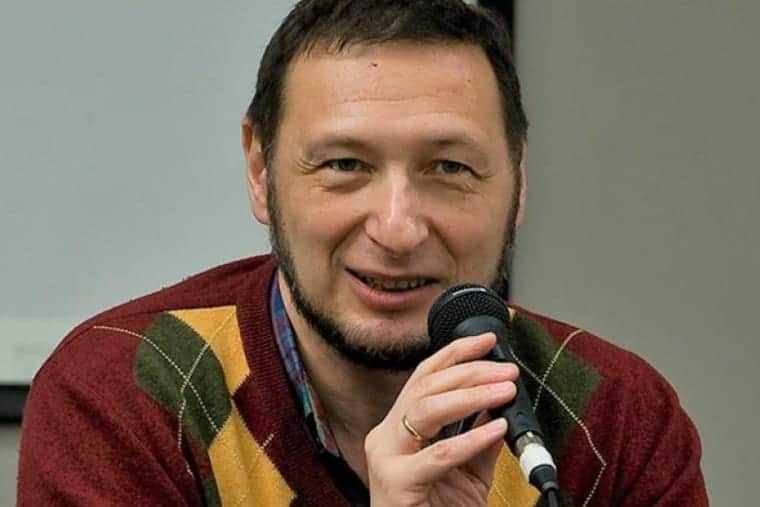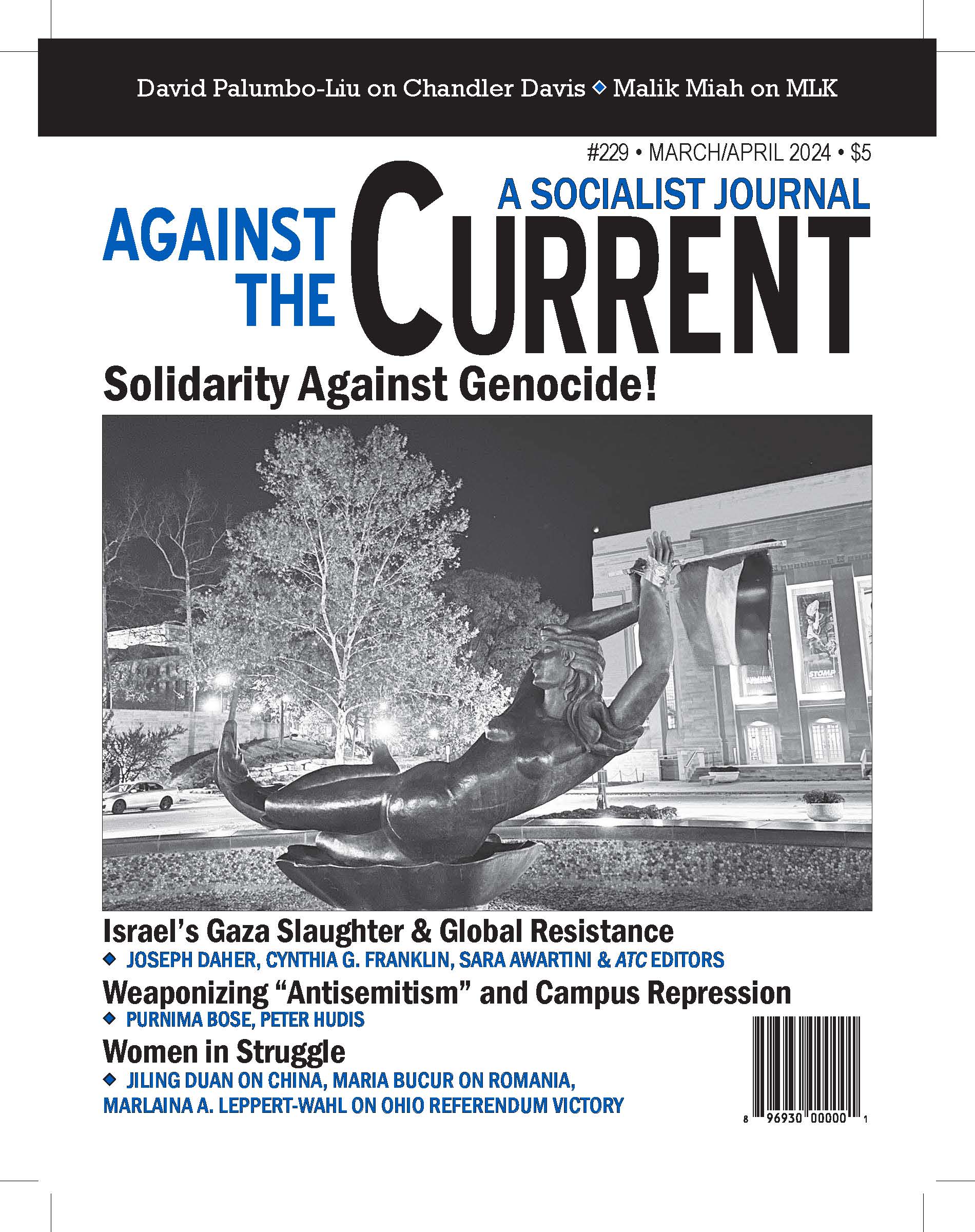Against the Current No. 229, March/April 2024
-
What Genocide Looks Like
— The Editors -
Middle East Tensions Grow
— Joseph Daher -
Charges of Antisemitism Weaponized
— Peter Hudis -
Campus Restrictions & Resistance
— Purnima Bose -
Refusing Colonial Constructs
— Cynthia G. Franklin -
Puerto Rican Solidarities with Palestine
— Sara Awartani -
Sergey Lavrov and Vulgar Anti-Imperialism
— Howie Hawkins - Free Boris Kagarlitsky!
-
Promised Land: Dimensions of the Agrarian Issue
— Hobeth Martínez Carrillo -
Mechanics of Colombia's Land Reform
— Hobeth Martínez Carrillo - Women in Struggle
-
Ohio's Citizen-Led Reproductive Rights Victory
— Marlaina A. Leppert-Wahl -
Sanba: Chinese Feminists in Struggle: Maoist Past, Coercive Present
— Jiling Duan -
Women's Activism in Romania--An Overview
— Maria Bucur - Reviews
-
Leader in a Time of Change
— Malik Miah -
King's Real View of Malcolm X
— Malik Miah -
Chandler Davis: Dissent and Solidarity
— David Palumbo-Liu -
Socialism Past, Socialism Present
— William Smaldone -
An Eco-Suspense Thriller
— Frann Michel -
A World of Collateral Damage
— Donald Greenspon - In Memoriam
-
Last of the Hollywood Blacklistees: Norma Barzman
— Paul Buhle

BORIS KAGARLITSKY, PROMINENT Russian sociologist and a leftwing critical analyst, has been snatched from court and sent to a prison camp on a five-year sentence for criticizing Russia’s annexationist invasion of Ukraine.
Kargarlitsky’s jailing is especially alarming in light of the February 16 news that the most famous Russian opposition leader Alexei Navalny has died in a penal colony, undoubtedly murdered by the prison authorities — whether by poisoning, neglect or some other method.
Shocking many observers, on February 13 the military court reversed a mid-December sentence by a different court imposing a $6500 fine, without prison time, for Kargarlitsky’s online post about Ukraine’s 2022 attack on the Crimea Bridge.
Prosecutors had appealed the verdict as too lenient, leading to the military court hearing. This turnabout clearly reflects the Putin regime’s intent to crush all remaining dissenting voices in Russia in advance of the coming staged peudo-election.
To help the defense, you can use Patreon or Busti of the international support group of Boris Kagarlitsky or write to their email: boris.solidarity@gmail.com. Any help is welcome.
After paying the fine and prior to his re-arrest, Kagarlitsky spoke with Jacobin Radio host Suzi Weissman about his case and four-month earlier detention in the case. The following are brief excerpts from that discussion.
I’M HAPPY TO see you again, Suzi. And of course, well, there are plenty of other political prisoners who are not as well known, who do not have so many friends around the world and so on. So even when you are facing political persecution, when you are more famous, more popular, more influential, you have a better chance to get out of jail.
I think it’s very important to know that there are still plenty of people of different political trends and tendencies, from left to right, who are still in jail in Russia, and we definitely need to advocate their release, and I hope they will all be released. I hope very much that that will happen soon.
In the current situation, the global South is still important for the Russian policymakers. Again, this is one of the good aspects of being a leftist, by the way — because if you’re a leftist, you care about the global South, you care about the Third World, you care about people outside of the Western countries. And that makes you more known also and more popular among these people outside Europe and North America.
As I learned, during these four and a half months, there were eight other political prisoners together with me at the same time. There were different people — those guys whom I met were intellectuals and political activists — but I knew that there were other people who probably got less attention, like a truck driver, people like that, working-class guys. And again, speaking about injustice and so on, they’ve gotten less attention.
Certain layers of the Russian bureaucracy are unhappy with what’s going on — extremely unhappy. They don’t want the kind of neo-autarkic state which some of the Russian leaders are trying to build up.
They are unhappy with the military operation in Ukraine, at least when it is not producing the expected results. So in that sense, of course, it’s true that Russian army is not losing the war at this stage, but it’s not winning either.
So this kind of war can continue endlessly, and there are plenty of people who aren’t happy with that. They don’t want the war forever. They don’t want their children to serve in the army within ten years from now, fighting the very same Ukrainian guys. By the way, I think the same happens in Ukraine as well. I have a reason to suspect that Ukrainian society is also tired. But I should say that there are people who are unhappy…
There is a lot of anti-war sentiment, but there is not much of an anti-war movement. Let’s be clear in Komi, I failed to see anyone who was supportive of the so-called military operation, just no one. At the same time, I didn’t see any strong opposition to it.
You see, it was just a kind of negative sentiment: This nasty thing going on, it’s better if it didn’t happen. It’s better if it ends. It’s better if we don’t take part in it. You know, why should we shoot at Ukrainians? Is there anything we have to fight for?
At the same time, there was no message about “Let’s protest.” No, no, no, no. There was almost no protest. And more and more, I met quite a few people who were quite ready to join the military in exchange of being released from jail.
I’m going to stay in Russia. Of course, if you are asking about that, I’m not going to leave. My plan is to stay over and to work with my friends. I know that some political emigrants are now returning. Well, we have to wait for the better times. And I think, the changes are going to happen quite soon.
March-April 2024, ATC 229

